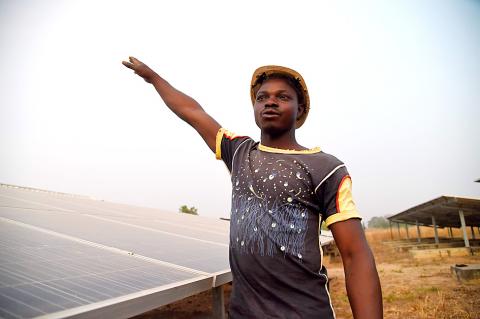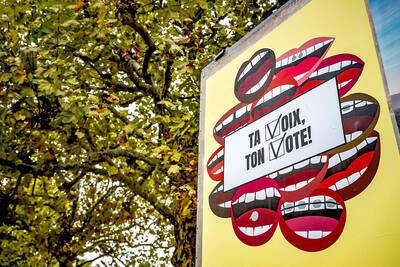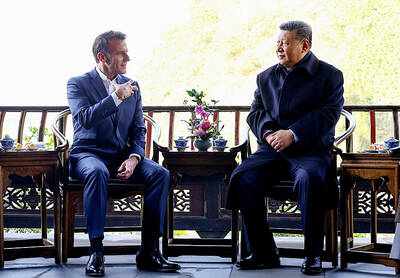Not so long ago, whenever he wanted to watch a soccer match or recharge his mobile phone, Ousmane Kantcho had to go “into town” — a 15km ride by bicycle on bad roads in the savannah.
His village, Tababou, lies more than 600km from the Togolese capital, Lome.
There, in one of Africa’s most energy-starved places, homes would plunge into darkness at nightfall, for the village was not connected to the national electricity grid. Torches provided the only light.

Photo: AFP
“After 6pm prayers, everyone stayed at home — there was nothing to do,” said Kantcho, a 35-year-old farmer.
“Everything’s different now,” he said, turning on his TV set.
Tababou has gone solar.
“Everyone gets together to watch the match at home and the children can do their homework late in the evening,” Kantcho said.
The creature comforts that are standard around the world — lights, TV and electrical sockets — have become available thanks to a 50-watt solar panel, installed on the roof of Kantcho’s mud-walled hut.
Kantcho and thousands of others are the beneficiaries of a public-private initiative launched in 2018 that aims to provide electricity across the West African country by 2030.
That objective, budgeted at 952 billion CFA francs (US$1.58 billion), would be met in great part by bringing in clean, renewable energy in rural areas, where most of Togo’s 8 million people live.
Locally generated power is far cheaper than connecting remote villages to a central grid — and helps to wean Togo off energy imported from Ghana and Nigeria, which provide half of its electricity needs.
“Not so long ago, we were really far behind other countries in the region, but we’ve gone full-bore over the last two years,” Abbas Abdoulaye, head of Togo’s agency for rural electrification and renewable energy, AT2ER, told reporters.
Only 30 percent of all Togolese had access to electricity in 2016 and 2017, a figure that has risen to nearly 50 percent today, he said.
Half of Togo’s population lives on less than US$1.90 per day, the threshold of extreme poverty, the World Bank has said.
People in more than 2,200 villages so far have taken the plunge by buying a solar home system, a kit comprising a solar panel, a charge controller to regulate power and a battery to store the energy for when the sun is not shining.
The kit is enough to power lights, a radio and a small TV for several hours a day.
The systems are being sold and installed by private companies, such as Britain’s Bboxx, which said it has sold more than 150,000 systems in more than 35 countries.
Customers pay an installation charge of about 10,000 CFA francs and then pay off the cost of the gadget in monthly installments of 4,800 CFA francs over the next three years. Half of the cost is subsidized by the state.
“It operates a bit like microcredit,” Bboxx marketing director for Togo Alexandre Kouigan said.
More than 500,000 households would get individual kits over the next decade, the government hopes.
According to a report by the UN Environment Programme and the Frankfurt School of Finance and Management, Africa offers one of the world’s most promising markets for solar — investment rose 19 percent in 2018 from 2017, to US$10.1 billion.
Some villages in Togo are opting for a more sophisticated system — so-called solar mini-grids, comprising a centralized group of panels to harvest the sunlight, and whose power is shared among households and shops and nearby cellphone towers.
The village of Takpapieni, in the far northern region of Savanes, gained one of Togo’s first mini-grids in May 2018.
Two of the participants in the scheme are Daniele Daoula and her husband. She grows crops to pay for the power credits.
“We like it, but it gobbles up money,” she said.
“When you buy 2,500 CFA francs of credits, that’s not enough for even a month,” she said, laughing. “When the credit runs out, we just sit in the dark!”

A plan by Switzerland’s right-wing People’s Party to cap the population at 10 million has the backing of almost half the country, according to a poll before an expected vote next year. The party, which has long campaigned against immigration, argues that too-fast population growth is overwhelming housing, transport and public services. The level of support comes despite the government urging voters to reject it, warning that strict curbs would damage the economy and prosperity, as Swiss companies depend on foreign workers. The poll by newspaper group Tamedia/20 Minuten and released yesterday showed that 48 percent of the population plan to vote

PARLIAMENT CHAOS: Police forcibly removed Brazilian Deputy Glauber Braga after he called the legislation part of a ‘coup offensive’ and occupied the speaker’s chair Brazil’s lower house of Congress early yesterday approved a bill that could slash former Brazilian president Jair Bolsonaro’s prison sentence for plotting a coup, after efforts by a lawmaker to disrupt the proceedings sparked chaos in parliament. Bolsonaro has been serving a 27-year term since last month after his conviction for a scheme to stop Brazilian President Luiz Inacio Lula da Silva from taking office after the 2022 election. Lawmakers had been discussing a bill that would significantly reduce sentences for several crimes, including attempting a coup d’etat — opening up the prospect that Bolsonaro, 70, could have his sentence cut to

A powerful magnitude 7.6 earthquake shook Japan’s northeast region late on Monday, prompting tsunami warnings and orders for residents to evacuate. A tsunami as high as three metres (10 feet) could hit Japan’s northeastern coast after an earthquake with an estimated magnitude of 7.6 occurred offshore at 11:15 p.m. (1415 GMT), the Japan Meteorological Agency (JMA) said. Tsunami warnings were issued for the prefectures of Hokkaido, Aomori and Iwate, and a tsunami of 40cm had been observed at Aomori’s Mutsu Ogawara and Hokkaido’s Urakawa ports before midnight, JMA said. The epicentre of the quake was 80 km (50 miles) off the coast of

RELAXED: After talks on Ukraine and trade, the French president met with students while his wife visited pandas, after the pair parted ways with their Chinese counterparts French President Emmanuel Macron concluded his fourth state visit to China yesterday in Chengdu, striking a more relaxed note after tough discussions on Ukraine and trade with Chinese President Xi Jinping (習近平) a day earlier. Far from the imposing Great Hall of the People in Beijing where the two leaders held talks, Xi and China’s first lady, Peng Liyuan (彭麗媛), showed Macron and his wife Brigitte around the centuries-old Dujiangyan Dam, a World Heritage Site set against the mountainous landscape of Sichuan Province. Macron was told through an interpreter about the ancient irrigation system, which dates back to the third century